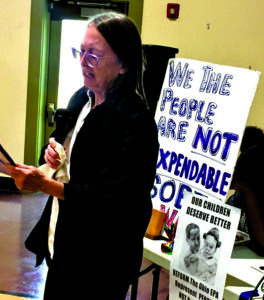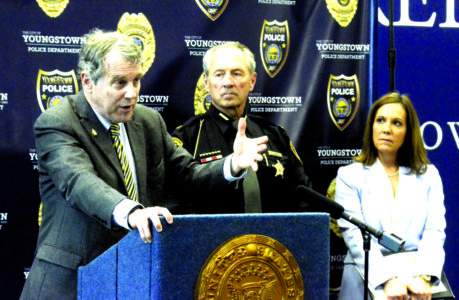Town hall participants keep the heat on SOBE

Correspondent photo / Sean Barron Lynn Anderson, who represents SOBE Concerned Citizens of Youngstown, addresses a town hall Monday at the Richard W. and Eugenia C. Atkinson Recreation Center in Youngstown. The group provided updates on its goal to stop SOBE Thermal Energy Systems LLC from processing and burning tire chips in the city.
YOUNGSTOWN — While SOBE Thermal Energy Systems LLC finds itself ensnared in legal wrangling, a grassroots group determined to stop it from burning rubber appears to be on a straight and determined trajectory.
“We do not want them here polluting our air and placing us in danger,” Kayshia Washington, the SOBE Concerned Citizens of Youngstown’s community organizer, said.
Washington was among those who spoke at a town hall meeting the group hosted Monday at the Richard W. and Eugenia C. Atkinson Recreation Center, 903 Otis St., near downtown. The two-hour session at which several dozen attended was aimed at providing updates on efforts to stop the Dublin, Ohio-based company from converting rubber tire chips into synthetic gas — a process known as pyrolysis — at its facility, 205 North Ave., in the shadow of the downtown corridor.
Among other things, the process would add to the region’s pollution by releasing cancer-causing carcinogens into the air while operating too closely to Youngstown State University, its student housing units and adjacent residential neighborhoods, as well as many restaurants and other entities in a city that continues to undergo revitalization and a renaissance, Washington contended. Overall, she and others have said, pyrolysis has neither been tested nor proven safe, and SOBE has been permitted “as a steam heating and cooling company only.”
Nevertheless, last year, David Ferro, SOBE’s chief executive officer, said that his company would use only shredded tire pieces and that the process would not emit hazardous waste or emissions.
Another major argument against the company’s plans is that the downtown corridor has been zoned a mixed-use community, which prohibits expansion into industrial use, Washington noted.
Meanwhile, SOBE is facing its own legal challenges. The business lost a $468,000 federal lawsuit that Wheeling, Illinois-based Wabash Power Equipment Co. filed in November, alleging SOBE had breached an equipment lease agreement SOBE had signed in November 2019. In January, a federal judge ruled in Wabash’s favor, thus issuing the final $468,000 judgment.
Also, last month, Alcon Piping Inc. of Niles filed a $428,458 lawsuit against SOBE that alleges Ferro had delivered a check to Alcon that, when cashed in February, was returned for insufficient funds. The check was to pay for installing piping at two downtown Youngstown businesses to which SOBE delivers steam heat.
Further complicating matters for SOBE was its Columbus law firm’s request last month to withdraw from the case, which would leave the company with no legal representation.
At Monday’s session, Washington provided a two-year time line of her group’s efforts to stop the company from making then selling synthetic gas. Key among them was using zoning enforcement and a moratorium ordinance against gasification and pyrolysis at the plant, Washington said.
To that end, Youngstown city council voted unanimously in November 2024 to approve a one-year moratorium, which expires Dec. 25. SOBE Concerned Citizens is calling for the moratorium to be reinstated after that.
The group also is on the front lines of efforts to revoke a 10-year “air permit-to-install-and-operate” that the Ohio Environmental Protection Agency issued Feb. 14, 2024, which would allow SOBE to gasify or combust whole tires or tire chips, plastics and electronic waste into synthetic gas to sell, Lynn Anderson of SOBE Concerned Citizens, said. On July 6, 2023, the Ohio EPA had issued a draft permit.
To sign the group’s petition to revoke the permit, go to www.stop-sobe.com.
HELP IN THEIR FIGHT
Among the speakers the SOBE Concerned Citizens group invited to Monday’s meeting to bolster its argument against SOBE’s ambitions was Aaron Makatura of the Pittsburgh-based Environmental Health Project, a nonprofit organization that defends public health in the face of gas and oil development. He noted that nearly a year ago, several low-cost air monitors were installed in and around Youngstown as part of an 11-month baseline study conducted between Sept. 5, 2024, and Aug. 4 to test air quality.
A key conclusion was that toxic air — given the results of having measured fine particulate matter during that period — in the Youngstown area was worse than about 60% of air quality in the U.S., Makatura noted. In addition, pollution levels exceed readings that the World Health Organization deem acceptable for healthy air, he said, adding that pollution spikes tend to be more prominent in winter and summer.
In his remarks, Makatura recommended that SOBE Concerned Citizens and others work toward the issuance of a permanent moratorium to stop SOBE, along with stricter zoning measures, and that they continue to engage and collaborate with local government officials and the community as a whole, as well as get in the habit of monitoring air quality.
Becca Pollard of the Buckeye Environmental Network noted that besides SOBE plants in Youngstown and Lowellville, five similar ones across the state have been built, are under construction or are being considered, including a facility near Ironton in southern Ohio. One of BEN’s main aims is to educate communities near such plants on how to monitor them and, when necessary, fight against them, she said.
BEN is a nonprofit organization that states as its primary mission “to support grassroots environmental justice, and protect Ohio’s native forests and their inhabitants through education, organizing and advocacy,” according to its website.
Kendall McPherson, a fellow at Case Western Reserve University’s Kramer Environmental Law Clinic, recalled that in late 2023, SOBE Concerned Citizens reached out to the firm, around the time Youngstown city council approved the one-year moratorium.
She also noted that Youngstown had filed an Environmental Review Appeals Commission case against SOBE and Ann Vogel, the former Ohio EPA director. ERAC is a state-level administrative tribunal that hears appeals related to environmental and other similar regulatory issues that the Ohio EPA, the state fire marshal, the Ohio Department of Agriculture and the state Emergency Response Commission made.
Along those lines, the city’s board of control hired Ranajit “Ron” Sahu of Alhambra, California, in March to testify before ERAC in its case against SOBE. In a more recent effort to stop the company, city council earlier this month was asked to allow the board to spend as much as $30,000 for another expert witness in the case who is an environmental services expert.
In November 2021, SOBE bought the former Youngstown Thermal LLC and Youngstown Thermal Cooling LLC building for $250,000. Beforehand, Youngstown Thermal had a long track record of problems running its cooling system, which often left several downtown entities without air conditioning in the summer.


